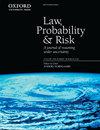Commonsense Consent
IF 1.4
4区 社会学
Q1 LAW
引用次数: 19
Abstract
Consent is a bedrock principle in democratic society and a primary means through which our law expresses its commitment to individual liberty. While there seems to be broad consensus that consent is important, little is known about what people think consent is.This Article undertakes an empirical investigation of people’s ordinary intuitions about when consent has been granted. Using techniques from moral psychology and experimental philosophy, it advances the core claim that most laypeople think consent is compatible with fraud, contradicting prevailing normative theories of consent. This empirical phenomenon is observed across over two dozen scenarios spanning numerous contexts in which consent is legally salient, including sex, surgery, participation in medical research, warrantless searches by police, and contracts.
Armed with this empirical finding, this Article revisits a longstanding legal puzzle about why the law refuses to treat fraudulently procured consent to sexual intercourse as rape. It exposes how prevailing explanations for this puzzle have focused too narrowly on sex. It suggests instead that the law may be influenced by the commonsense understanding of consent in all sorts of domains, including and beyond sexual consent.
Meanwhile, the discovery of “commonsense consent” allows us to see that the problem is much deeper and more pervasive than previous commentators have realized. The findings expose a large—and largely unrecognized—disconnect between commonsense intuition and the dominant philosophical conception of consent. The Article thus grapples with the relationship between folk morality, normative theory, and the law.
常识性的同意
同意是民主社会的基本原则,也是我们的法律表达其对个人自由承诺的主要手段。虽然人们似乎普遍认为同意很重要,但人们对同意的看法却知之甚少。本文对人们关于同意何时被授予的普通直觉进行了实证调查。利用道德心理学和实验哲学的技术,它提出了一个核心主张,即大多数外行人认为同意与欺诈是相容的,这与主流的同意规范理论相矛盾。这种经验性现象可以在二十多个场景中观察到,在这些场景中,同意在法律上是重要的,包括性行为、手术、参与医学研究、警察无证搜查和合同。有了这一实证发现,本文重新审视了一个长期存在的法律难题,即为什么法律拒绝将以欺诈手段获得的性交同意视为强奸。它揭示了对这个谜题的主流解释是如何过于狭隘地关注性别。相反,它表明法律可能会受到对所有领域的同意的常识性理解的影响,包括和超越性同意。与此同时,“常识性同意”的发现让我们看到,这个问题比以前的评论员所意识到的要深刻得多、普遍得多。这些发现揭示了常识性直觉和占主导地位的“同意”哲学概念之间存在着很大程度上未被认识到的脱节。因此,本文论述了民间道德、规范理论和法律之间的关系。
本文章由计算机程序翻译,如有差异,请以英文原文为准。
求助全文
约1分钟内获得全文
求助全文
来源期刊

Law Probability & Risk
MATHEMATICSSTATISTICS & PROBABILITY&-STATISTICS & PROBABILITY
CiteScore
2.10
自引率
28.60%
发文量
8
期刊介绍:
Law, Probability & Risk is a fully refereed journal which publishes papers dealing with topics on the interface of law and probabilistic reasoning. These are interpreted broadly to include aspects relevant to the interpretation of scientific evidence, the assessment of uncertainty and the assessment of risk. The readership includes academic lawyers, mathematicians, statisticians and social scientists with interests in quantitative reasoning.
The primary objective of the journal is to cover issues in law, which have a scientific element, with an emphasis on statistical and probabilistic issues and the assessment of risk.
Examples of topics which may be covered include communications law, computers and the law, environmental law, law and medicine, regulatory law for science and technology, identification problems (such as DNA but including other materials), sampling issues (drugs, computer pornography, fraud), offender profiling, credit scoring, risk assessment, the role of statistics and probability in drafting legislation, the assessment of competing theories of evidence (possibly with a view to forming an optimal combination of them). In addition, a whole new area is emerging in the application of computers to medicine and other safety-critical areas. New legislation is required to define the responsibility of computer experts who develop software for tackling these safety-critical problems.
 求助内容:
求助内容: 应助结果提醒方式:
应助结果提醒方式:


